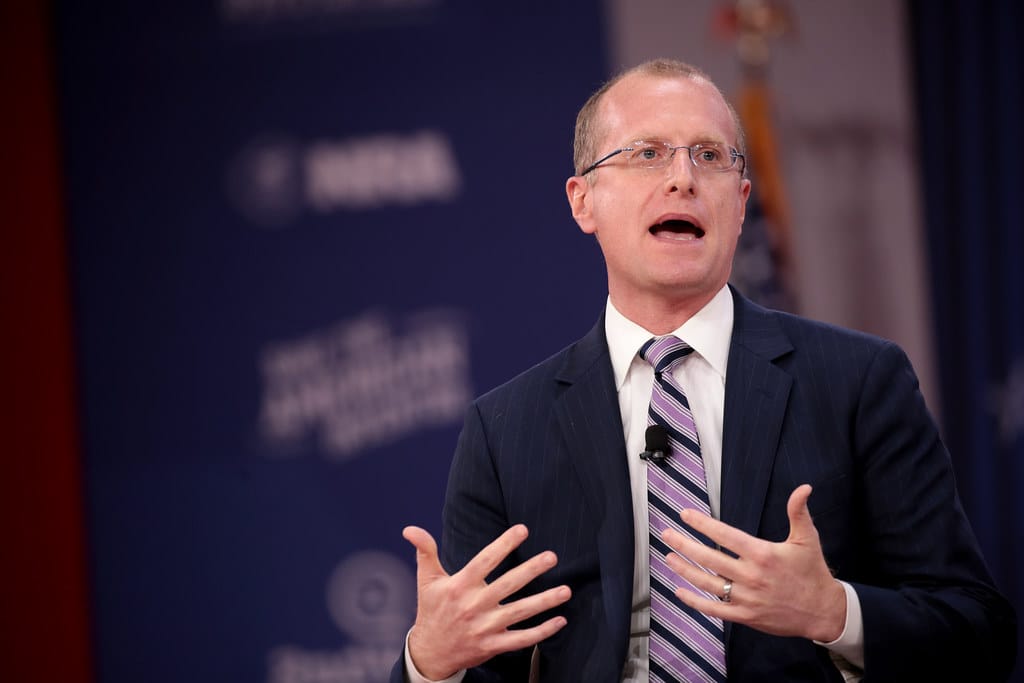FCC Commissioner Carr Argues For Big Tech Contribution To Broadband
Brendan Carr said big tech companies have benefitted from the internet — so they should contribute.

May 25, 2021 – Federal Communications Commissioner Brendan Carr wrote in an op-ed in Newsweek on Monday that tech firms that benefit from the internet should contribute to it.
It is what Carr calls a fundamental rethink in the way the country finances broadband infrastructure programs and closes the digital divide, which is increasingly reliant on a broadband fund that obtains contributions from voice services.
Carr argues that Congress should seek to pass legislation that “ensures Big Tech contributes an equitable amount.” He offers a variety of revenue streams that could sufficiently provide the needed funds, including video streaming services, online advertising agencies like Google and Facebook and online gaming platforms like Microsoft’s Xbox Live gaming service.
He also believes the FCC should aim to end its tax on monthly telephone bills.
“Ending Big Tech’s free ride on the internet would represent a long-overdue return to the historic compact under which the businesses that benefit from a network pay their fair share for it,” Carr says.
“It would lower monthly bills for millions of Americans. And it would secure a funding model that can support the long-term investments needed to close the digital divide—a result that will allow businesses and consumers alike to prosper.
The debate on contribution to broadband funding
Experts have debated the merits of possible avenues for broadband funding to expand basic telecommunications services to all Americans. A recommendation that is picking up steam is to draw the funding from general taxes, which Carr calls antiquated.
A better option, he says, is to shift the costs onto private entities profiting off of the provided infrastructure, such as large technology companies.
AT&T’s assistant vice president of regulatory affairs said at a debate earlier this year that while the company prefers general taxation for broadband funding, expanding the base to include other technology companies would reduce the contribution burden on individual companies.
The present method, which draws $10 billion a year, used by the FCC to finance the Universal Service Fund — which provides money to connect Americans in un(der)connected areas like rural territories — is through telephone service providers, who either pay the amount from their own reserves or pass on the cost to customers as a line item on their monthly bill.
Revenues associated with traditional telephone services have fallen sharply from around $80 billion in the 2000s to less than 30$ billion today as more and more services, such as Facebook’s WhatsApp, are delivered over the internet. Still, the FCC relies on revenues of the shrinking market to fund its current internet projects. That contribution rate has surged above a record-setting 30 percent of voice revenues.
“This is like taxing horseshoes to pay for highways,” Carr says. “This is not sustainable; relying on this model to fund additional infrastructure would strain the system well past its breaking point.”
Shifting the Burden Away from Taxpayers
“Big Tech has been enjoying a free ride on our internet infrastructure while skipping out on the billions of dollars in costs needed to maintain and build that network.”
Imagine a business charging clientele for its services while the clients are also taxed in order to provide the physical capital needed for the business to operate. That’s how the current system of broadband deployment operates.
Carr says that 75 percent of all traffic on rural broadband networks are directed to just five companies—Netflix, YouTube, Amazon Prime, Disney+, and Microsoft. Similarly, he added, approximately 77-94 percent of total network costs are related to supporting the delivery of those streaming services.
Big Tech collects great value from these publicly provided services, having generated nearly $1 trillion in revenues in 2020 alone. It would take just 0.009 percent of that revenue to eliminate the current 30-plus percent contribution levied by the FCC on service providers, who then pass that on to consumers.
Support
In a series of tweets responding to Carr’s op-ed, the conservative think tank Free State Foundation said Carr has presented a “persuasive case” for big tech contributions. It said the old system of taxation was rationally applicable to the market 20 years ago, when these big technology companies were “infants.”
They needed protection and couldn’t be expected to front the burden of providing infrastructure themselves, the FSF said, adding that decades later, they are hardly infants anymore.
Editor’s Note: A prior version of this story stated that the Free State Foundation was a “political” think tank. Rather, Free State Foundation is a non-partisan, conservative-oriented think tank under Section 501(c)(3) of the Internal Revenue Code. The story has been updated.









